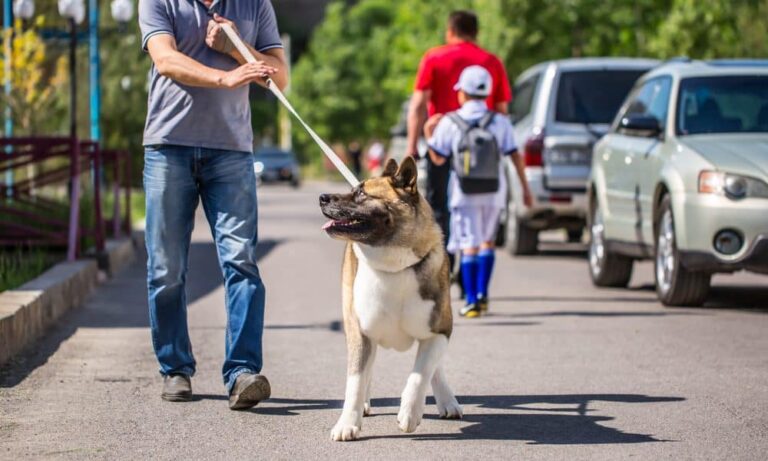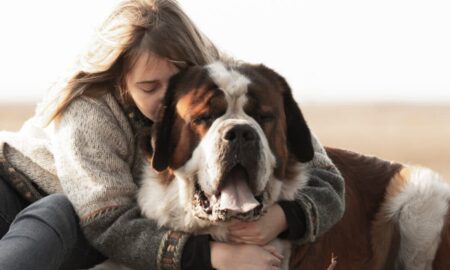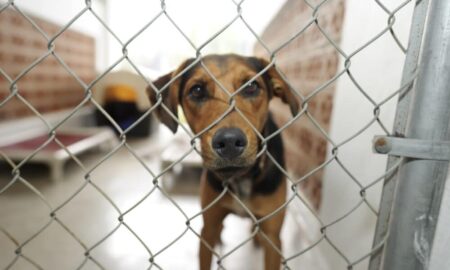Throughout Nationwide Canine Chunk Prevention Week (April 11-17), a coalition of veterinarians, animal conduct consultants, and insurance coverage representatives are urging individuals to take steps to stop a surge in canine bites because the climate warms, lockdowns ease, and life returns to regular.
To supply extra suggestions for pet house owners, members of the Nationwide Canine Chunk Prevention Week Coalition— which incorporates the American Veterinary Medical Affiliation (AVMA), State Farm, Insurance coverage Data Institute (Triple I), American Humane, and Victoria Stilwell Positively— will likely be internet hosting a Fb Dwell occasion on Monday, April 12, at 1 p.m. Japanese.
The occasion, hosted by licensed animal conduct advisor Steve Dale, will talk about coaching suggestions to assist forestall bites, the right way to safely socialize your canine after a 12 months of isolation, and the right way to acknowledge the warning indicators {that a} canine could chew. As well as, the coalition will likely be releasing the newest dog-related harm claims knowledge.
In keeping with State Farm, the month with the very best variety of dog-related harm claims final 12 months was March, when individuals first went into lockdown firstly of the COVID-19 pandemic. They reported a 21.6% improve in canine bites in comparison with the earlier March, seemingly on account of canine coping with proprietor stress, disruption in routines and extra individuals round the home all through the day. Specialists concern one other disruption—this time trigger by the easing of restrictions for actions exterior the house—might result in one other spike in bites.
The Insurance coverage Data Institute reported that in 2020, insurance coverage firms paid $853.7 million for 16,991 canine chew and harm claims. Whereas the variety of dog-related harm claims decreased 4.6% in comparison with the earlier 12 months, the quantity paid for these claims elevated 7.1%–a report excessive. The typical declare cost was $50,245 in 2020, up 12.3% from $44,760 in 2019.
“Final 12 months presently many individuals—and pets—have been within the early levels of lockdown mode, and the stress and disruption of this alteration may be seen once we have a look at the information on canine bites,” mentioned Dr. Douglas Kratt, president of the AVMA. “This 12 months, as we start to emerge from these lockdowns and isolation, our concern is ensuring our canine—a lot of which have been adopted throughout the previous 12 months—are ready for secure interactions exterior of the house.”
“As a result of the nervousness that isolation produces can result in unfavourable behaviors in our pets, serving to canine put together for adjustments in our schedules will assist reduce their nervousness and clean the transition as we return to the workplace and different actions exterior of the home,” mentioned Dr. Lesa Staubus, rescue veterinarian for American Humane.
To assist our pets with this transition, the Nationwide Canine Chunk Prevention Coalition recommends the next suggestions:
• Make sure that your pet is wholesome. Not all sicknesses and accidents are apparent, and canine usually tend to chew if they’re sick or in ache. When you haven’t been to the veterinarian shortly, schedule an appointment for a checkup to debate your canine’s bodily and behavioral well being.
• Take it gradual. In case your canine has solely been interacting with your loved ones this previous 12 months, don’t rush out into crowded areas or canine parks. Attempt to expose your canine to new conditions slowly and for brief intervals of time, organize for low-stress interactions, and provides loads of reward and rewards for good conduct.
• Educate your self in constructive coaching methods and dedicate time to work together along with your canine.
• Get exterior for leash coaching and permit your canine to do extra socializing.
• Progressively begin arranging play dates with different canine and other people as allowed, and punctiliously improve the quantities of time and freedom collectively. This can assist your canine get used to being with different canine companions once more.
• Be accountable about approaching different individuals’s pets. Ask permission from the proprietor earlier than approaching a canine, and search for indicators that the canine desires to work together with you. Generally canine wish to be left alone, and we have to acknowledge and respect that.
It’s additionally essential to do not forget that even well-trained and well-behaved canine can chew if they’re put into the incorrect scenario. Addressing and avoiding these conditions is essential to decreasing canine bites, and never specializing in unrelated elements reminiscent of a canine’s breed or look.
“Identical to people, canine are people, and each canine has a singular character,” mentioned Heather Paul, public affairs specialist at State Farm. “That’s one motive why State Farm doesn’t ask what breed of canine an individual owns. Whereas their breed or kind could dictate how they give the impression of being, how a canine reacts in a scenario isn’t assured by what breed or kind of canine they’re, so it’s essential to acknowledge that whereas most canine gained’t chew, any canine can chew and as accountable pet house owners it’s our responsibility to make it possible for we’re preserving each our pets and other people secure.”
“When individuals speak about canine chew prevention, the main focus routinely goes to canine coaching,” mentioned Victoria Stilwell, celeb canine coach and conduct skilled. “Whereas it’s essential that we give canine abilities and train them primary manners, the emphasis really needs to be on constructing emotional well being and wellness to allow them to achieve success in our human home world.”
“Whereas canine bites are a critical public well being challenge, the excellent news is that the majority canine bites are preventable,” mentioned AVMA President Dr. Kratt. “By taking steps to coach and correctly socialize our canine, and educate ourselves and family members on canine chew prevention, we can assist cut back bites and maintain canine in loving properties, the place they belong.”
For extra recommendations on stopping canine bites, go to AVMA.org/DogBitePrevention.
SOURCE American Veterinary Medical Affiliation







